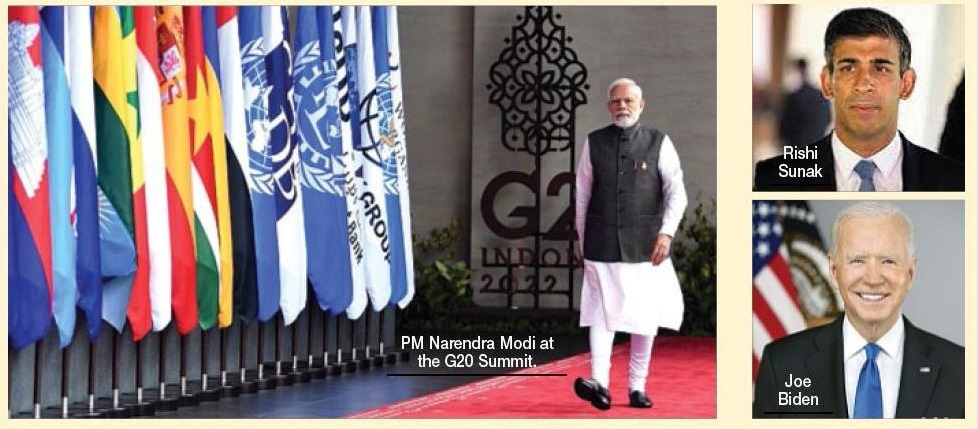LEADERSHIP IN THE ERA OF CRISIS
| Date :18-Nov-2022 |

By Kartik Lokhande :
PRIME Minister Mr.
Narendra Modi’s meetings
with the world leaders
and the declaration at G20
Summit that today’s era must
notbeofwar,reflectsonething
for sure -- India has a strong
leadership rooted in Indian
values but transcending the
boundaries of nation in
impact. One more thing that
becomes clear is that India is
amongvery fewcountriesnow
that have a strong leadership.
For, much of the
p r e s e n t - d a y
world is bogged
down by crisis.
As is known,
the world is passing
through a
phase of transition.
It is not only
about COVID-19
and its impact on
global economic
order.

It is also about reshaping
of political order due to
issues that have hit the collective
consciousness of the
comityofnations.Issuesrange
from global terrorism to rise
of fundamentalism, and contributetovolatility.
Besides,liberalism
without any stability
of direction and rebellion
without any cause appear to
have weakened the democratic
setups of different hues.
For example, after a series
of elections, once again Mr.
Benjamin Netanyahu has
emerged as leader of Israel.
But, the phase of disturbance
underscored that there was
no other leader stronger than
Netanyahu was. Similarly, Mr.
Mario Draghi of Italy has
resigned in frustration. But,
Italians in general feel that
there is no as solid an option
to him at present. The oncesuperpower
United Kingdom
hasbeenfacingleadershipcrisis
for quite some time. Since
the quitting of Mr. David
Cameron, the UK has seen
Prime Ministers in quick succession
without anyone rising
to the challenge as formidably
as he did. Now, Mr. Rishi
Sunak offers some promise
but he, too, is faced with challenges.
It will be interesting to
watch whether Mr. Sunak
emerges as the
leader that the
crisis-riddenUK
needs the most.
But,theUK’scrisis
of leadership
has been pretty
clear in the past
few years.
The US also
has seen murky
elections.
The
public intellectuals there have
been expressing opinions that
the US was in crisis of leadership
as the people had to
choose between Mr. Donald
Trump and Mr. Joe Biden, and
no one better than both. More
recently, despite falling
approval ratings, Mr. Biden
received a boost with
Democrats retaining control
of the US Senate. But, once
again, Mr. Trump has
announced that he would run
for the President in 2024. The
third face in the race is yet to
emerge. Even if that face
emerges in due course of time,
whether that face becomes a
leader of impact to pull the US
out of crisis in terms of civilisationalmaturitywillbeinteresting
to watch. Mr.Vladimir
Putin and Mr. Xi Jinping are
‘strongmen’ leading Russia
and China respectively. But,
their leadership has the trappings
of pushing respective
countries into deeper crisis at
a later stage.
Then, there is Sri Lanka,
where President Mr. Gotabaya
Rajapaksa was driven out of
hisofficeamidpopular unrest.
There are some African countries
where crisis is the buzzword.
Pakistan is turning into
a country with turmoil being
part of its polity, economy, and
demography. It has not been
able to see a strong leader,
who would pull the country
out of the abyss of radicalism.
Its neighbour Afghanistan is
no better. One can go on and
on citing examples of countries
to prove that many countries
today are facing the crisis
of leadership.
Therearemanyreasonsthat
have contributed to this situation.
But, the biggest one is
probably the civilisational
degeneration in many areas.
The first and foremost could
be the education system that
has started focussing more on
‘Marks-ism’ instead of creating
excellent human beings
who can think originally.
Further, as far as opportunities
are concerned, more
emphasis is being laid on
‘brands of education’ (institutions
and degrees) instead
of treating thinking of an individual
as a capital.Then, there
is ‘elective merit’ that has
degenerated into something
that has to do with moneybagism
and muscle-power statement.
Social media has just
worsened the situation. For,
though they are pure businesses,
unsuspecting people
(who are voters, by the way)
start believing anything and
everything that ‘trends’ on it
and fall prey to the propagandist
machinations of those
who are trying to decide who
gets to power.
The so-called
social media is setting narratives
in favour of the highest
bidder of services, and is turning
people away from own
thinking. Thus, it is creating a
situation where people prefer
‘following’over‘leading’.These
aspects (there may be many
others) have led to a situation
wherein those who emerge
from such a crisis-ridden society
are being treated as leaders
on the foamy parameters.
If one compares India with
many other nations, one feels
that there is a strong leadership
at the helm of affairs at
present. Disturbed by the rise
of India at global stage, forces
-- internal and external -- have
been resorting to all sorts of
strategiesandtacticstoputthe
present-dayIndianleadership
in trouble. But, people know
that no other leader in India
can provide an alternative to
Mr. Modi’s all-encompassing
and globally effective leadership.
But, that again, underscores
the need for having a
civilisational mechanism
wherein equally effective, if
notbetter,leadershipkeepson
emerging from the society.
India has the potential to be
a global leader in this regard
too. To make it happen, leadership-
generating civilisational
mechanism has to be
putinplaceandstrengthened.
For, no crisis is insurmountable
if leadership is strong
and good.